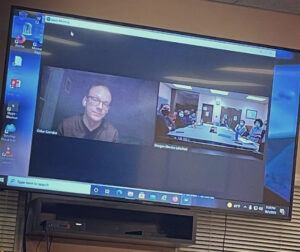 A shared pivotal experience in every early-graduate school career, it seems, is one’s first seminar. The professors know each other, older graduate student ask insightful questions, and first and second years don’t know where to begin. It was on the basis of these experiences that Oskar Czendze and Till Knobloch, two Ph.D candidates in modern European history, decided to found the European History Seminar for Graduate Students in January 2019.
A shared pivotal experience in every early-graduate school career, it seems, is one’s first seminar. The professors know each other, older graduate student ask insightful questions, and first and second years don’t know where to begin. It was on the basis of these experiences that Oskar Czendze and Till Knobloch, two Ph.D candidates in modern European history, decided to found the European History Seminar for Graduate Students in January 2019.
The goals of this group are simple: to provide a “safe space” for graduate students to present their work, test ideas, and ask questions of each other without the pressures of more formal seminars held by the department. Though originally created with graduate students in European history in mind, the seminar has expanded beyond a narrow regional focus and has hosted presentations on British and French colonialism in Africa, Russian and Soviet history, and diplomatic relations between West Germany and China. Till and Oskar emphasize that the European History Seminar’s highest priority is to offer an accessible setting for graduate students to practice being involved in an intellectual community and gain confidence engaging with each other’s work, without being tied to narrow definitions of “European” scholarship. Oskar highlights the importance of support among seminar: “There is a social aspect to the group. We get together as academics and friends, experiment with our ideas, and have a community we can trust with our work.”
Coronavirus restrictions forced the seminar online in spring 2020, but this shift also allowed for the program to expand. Through pre-existing connections between the University of North Carolina (UNC) and King’s College London’s (KCL) History Departments as well as UNC’s Collaborative Online Integrated Learning (COIL) program, the seminar is now open to graduate students from KCL and Charles University, Prague. In order to accommodate these international scholars, the seminar’s monthly meetings alternate between in-person meetings on UNC’s campus and online sessions with the KCL and Charles University students. Additionally, understanding how to run the seminar effectively on Zoom has allowed for additional benefits, such as the involvement of UNC graduate students currently abroad or not on campus.
In 2021, Morgan Morales and Alison Curry took over leadership of the European History Seminar and are hoping to expand its membership by including more early modern and medieval scholars. Additionally, as the program’s relationships with KCL and Charles University develops, members of the Seminar hope to receive funding support for a scholar exchange between KCL and UNC, as well as potentially organize an online conference among KCL, UNC, and Charles University.
All four leaders of the European History Seminar value the community and support it provides. Morgan notes: “I always learn something new from each seminar, and I enjoy getting to learn more about what my colleagues are working on,” and adds that “we rarely talk about our work in depth with others, so its fun to see the actual inner workings of my colleagues’ and friends’ projects.” Alison adds that “I always leave the working group with something new to bring back to my own work.” When asked about a favorite memory from their work with the group, all four leaders mentioned a paper presented by Pasuth Thothaveesansuk on the role of pandas in diplomatic relations between West Germany and China. Pasuth’s presentation developed into a five-hour conversation amongst seminar participants, and with comments and revisions from the group Pasuth presented his paper at the German Studies Association conference in fall 2021.
In the two years of its existence, the European History for Graduate Students has successfully created a space for graduate students to gain confidence in their involvement in an intellectual community. The group now crosses disciplines and continents, and only hopes to continue being an accessible platform for UNC history graduate students to share their work with their colleagues and community.
